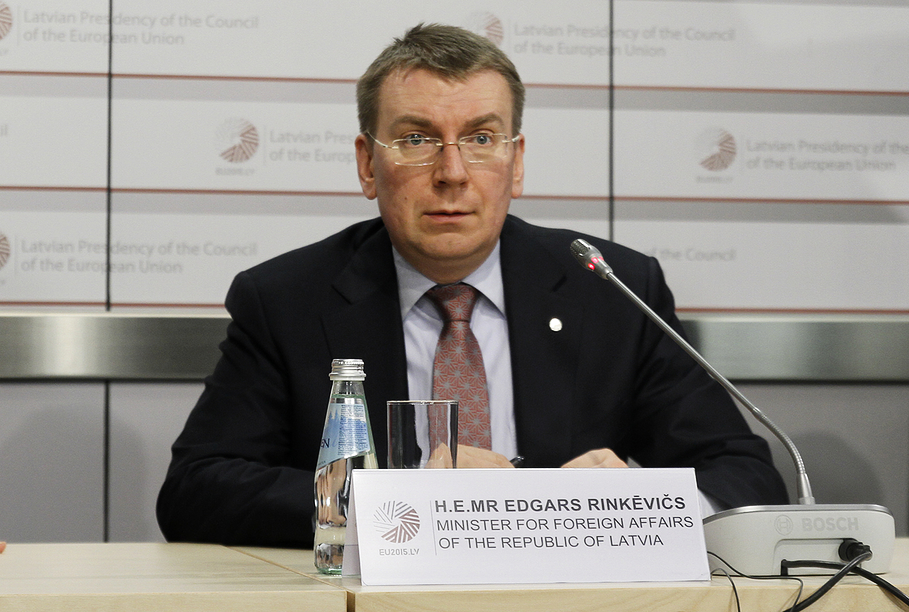He first outlined the three highlights in his view so far.
First, Rinkēvičs cited the successful navigation into implementation of the Strategic Investment Fund (SIF), which he stressed Latvia’s entrepreneurial community could take advantage of in the fields of energy and scientific research among small and mid-size businesses.
Second, the foreign minister hailed the foundation stones laid for energy union with its infrastructure links across EU regions formerly isolated from one another’s power supplies, such as the emerging unified gas market, which are multi-year projects which have begun.
Third, the steering through the extremely complicated stage of current world events – terror attacks and spreading warfare in the context of the Eastern Partnership EU integration process.
As for the remainder of the term of the Presidency, the nation’s senior diplomat said the May 21 EU Summit for the six Eastern Partnership countries would be the centerpiece event, undoubtedly, for which much preparation and untold unfolding of events still lies ahead.
Here is the remainder of Rinkēvičs talk with public radio listeners today:
In response to a listener who didn’t “feel what all those millions of euros were being spent on” the minister said.
“Well the fact that we’ve had no loud scandals about it is a positive thing. The financial resources invested primarily ensure that the working groups in Brussels and Riga can meet, there is the broad diplomatic and cultural program intended to bring Latvia’s name into the world, an entire line of personnel who must ensure the technical aspects of this undertaking.
So I would say to respond to all those who had prior trepidations purely out of not knowing what to expect for doing it the first time, this time we really have done the absolute maximum to ensure that things go smoothly during the term of all these complicated processes, that there are no major disruptions to them.
But I think most people see that the Presidency is not some loud and pompous series of events, like I’ve said before ‘not a carnival from the first of January’.
So, it’s no drama. We still have three months to go and I think we’re seeing that everyone is working at their utmost levels of professionalism, from our ministers all the way to our representative office in Brussels, and our entire civil service of state administration."
Another listener remarked upon Latvia’s lack of impact on world events, but the foreign minister opposed such a view.
“I‘d invite some people to finally start getting over their national inferiority complex and just mention again my three main points where we’re having an absolutely leading impact on decision-making processes.
So the Strategic Investment Fund and the Energy Union are things that you’ll feel way down the line and our involvement at this critical moment for geopolitical security means there’s still much for us to do, our final reports will come in after July 1st.”
Prodding about some of the behind-the-scenes moments that perhaps may have caught the Presidency unawares, the hosts asked what the hardest moment so far had been for the minister.
“We were warned by our colleagues that there would be an event that would get us to mobilize quickly and efficiently, and yes, the tragic Charlie Hebdo attacks on freedom in Paris and then right thereafter in Copenhagen, too, largely that has put us centrally on top of the internal security issues of the entire union regarding terrorism. What that has required from us is getting our Justice and Interior ministry task lists in line by the end of January.
What that will mean in practice almost effective immediately by June is the going into effect of increased security controls on travelers from outside of the EU, not internally, but from other third country states coming into any EU member state will have to accept the fact their passport and visa documents will undergo increased inspection through various databases.
The same goes for the airline passenger registry being shared with security agencies to analyze for external threats and risks. Although the passenger data register is more in the hands of the European Parliament than the Presidency now.
The second essential contribution is from the Transport Ministry in moving forward the internal roaming-charge price reform legislation in the telecommunications market for data transmission, we’ve begun a process that will only be complete after the Presidency to find a common ground between operators and customers.
So there are these practical events and processes taking place that people may actually feel entering effect quite soon or in time.”
The entire Pēcpusdiena broadcast can be heard below (in Latvian).





























